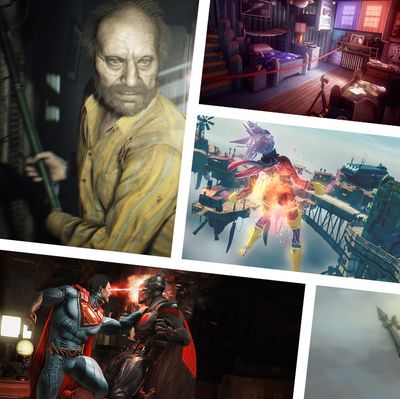

This week, Vulture is looking back at the best releases so far in 2017.
It’s been at least a decade since video games had a year that started as strong as 2017 — here we are in June with a list of games that would do most years proud in December. For much of it, we can thank a spectacularly resurgent Japan: After years of dire speculation about the state of Japanese game development, 2017 has opened with a string of modern Japanese classics, from Zelda to Resident Evil 7 to NieR: Automata, all wildly different, all immensely entertaining.
Gravity Rush 2 (Playstation 4)
Remember the scene at the end of Toy Story, where Buzz Lightyear looks like he’s actually flying, but he’s really falling “with style?” Gravity Rush 2 is all about falling with style — and how good it feels. You’re a girl named Kat, imbued with the power to change the direction gravity works. Point in a direction, and that direction is now “down.” With this strange, specific power, Kat can approximate flight and becomes a superhero of sorts, eagerly helping everyone she crosses paths with while looking for her friend and fellow gravity shifter, Raven. That’s a fun enough premise, but Gravity Rush 2 has a surprising level of ambition in its storytelling, using its bright, sunny world to prop up a fable about class and wealth, and how the concerns of the rich are often addressed at the cost of the poor.
Injustice 2 (Playstation 4, Xbox One, iOS, Android)
The sequel to 2013’s Injustice: Gods Among Us marks the return of NetherRealm Studios (the shop behind Mortal Kombat) to the DC pantheon of heroes. Set after the events of the first game, which depicted an aggressively dark narrative about Superman — tricked by the Joker into murdering a pregnant Lois Lane — killing the notorious villain and imposing worldwide martial law with the help of other heroes. Injustice 2 takes place after that regime’s fall, with Batman attempting to rebuild society, only to find the world threatened by an alien invasion.
Injustice 2’s story is still pretty dark, and not all that far from the Batman v Superman vision of the DC Universe, but it’s also crucially unafraid of being silly or fun. It also helps that NetherRealm has more or less perfected their cinematic approach to fighting games, with a story mode that plays like an action movie. Injustice 2 offers an incredible range of excuses to keep you fighting, from a steady stream of gear that’ll change your characters’ stats and appearance, to the Multiverse mode that comes with an array of timed challenges for you to take on. Smashing action figures together couldn’t be more satisfying.
Legend of Zelda: Breath of the Wild (Nintendo Switch, Wii U)
It’s hard not to talk about Breath of the Wild without heaping superlatives upon it. It’s not that it’s surprising for a Zelda game to be good — rather it’s that Breath of the Wild is good by being unlike its franchise predecessors, while still seeming like the quintessential Zelda game. Breath of the Wild is a game of moments both small and large, something to get lost in for hours or to idly play for a few moments. Enthralling in its austere presentation and quiet charm, it will likely prove to be the finest game released in a year full of stellar ones.
NieR: Automata (Playstation 4, PC)
In the far future, humanity has abandoned an Earth overrun by alien machines, leaving behind humanoid androids to fight on their behalf. You play as 2B, a member of the elite YorHa squadron of android warriors dedicated to eradicating the machines in a genre-bending action game that pivots from hack-and-slash combat to a more classic arcade-style shooter that feels a lot like Galaga.
Yet for as smooth and compelling as NieR’s gameplay shifts can be, they’re also the least interesting thing about the game — because NieR isn’t telling you everything. Its first ending is a fake-out. So is the second one. NieR demands that you examine it closely, that you interrogate its assertions and commit to playing it thoroughly, and if you see it through — which, at times, can be taxing — you’ll be rewarded with a definitive conclusion that’s among the most moving and genuinely surprising in big-budget video games. NieR: Automata is deeply philosophical, uncomfortable, and bleak at times, but also cuts it all with an extremely weird sense of humor. It isn’t for everyone, and that’s what makes it special. It’s a game interested in probing what it means to be human, and ends up feeling exactly that: human.
Persona 5 (Playstation 4)
The Persona series of games have long had one of the best high concepts in video games, mashing up Buffy-style occult-fueled teen soap operatics with Pokémon-style monster collecting and turn-based action. Combined with the series’ impeccable attention to style, and you have one of the downright coolest games in recent memory, right down to a jazzy soundtrack, vibrant design, and an exuberant joy it brings to just about everything it does.
While every Persona game shares similar themes and gameplay traits, each stands on its own. The fifth entry is about a group of teens who discover a shadow world where people’s innermost desires are given form — and the most toxic of those desires impose a cruel tyranny on those around them. With their newfound power, these teens set about finding people who victimize others in the real world, and change their hearts by supernatural means. Persona 5 is the definition of problematic fave — across what could easily be an 80-hour playthrough, it stumbles with some of its themes, its narrative focus, and in how it treats women (even as it makes efforts to decry sexual harassment). But it does just enough right to pull you through, and ultimately its teens versus adults setup as an exploration of power and the way it takes advantage of the powerless is compelling, even if it sometimes falters in its ambition.
PlayerUnknown’s Battlegrounds (PC)
You don’t have to play PlayerUnknown’s Battlegrounds to see that it’s an outright phenomenon, a game perfectly tuned for the Twitch- and YouTube-fueled game-streamer boom. Battlegrounds is perhaps the purest and most refined distillation of what’s become known as battle royale games, a genre that combines survival with deadly competition: You and 99 other players are dropped onto a map with nothing but your wits, and must fight to be the last man standing. It’s a remarkably simple setup that PC games have danced around for years, but Battlegrounds has emerged as king of the hill.
Resident Evil 7 (Playstation 4, Xbox One, PC)
The number seven after a title is usually, if not a bad sign, then an exclusive one, signaling this is for the hardcore. Not so with Resident Evil 7, a game that is so unlike its predecessors it might as well be a reboot; unless you’re a sharp-eyed Resident Evil devotee, you’d be hard-pressed to see any connections. As Ethan Winters, players embark on a first-person quest to find Ethan’s missing wife, Mia, who is being held prisoner on a decrepit Louisiana plantation. To rescue her, Ethan must survive the sadistic Baker family, who all have something very, very wrong with them. An at times unbearably tense game that plays like a mash-up of horror films like The Texas Chainsaw Massacre and Saw, Resident Evil 7 is a master class in big-budget horror games from a series that seemed like it was losing its edge.
What Remains of Edith Finch (Playstation 4, PC)
The Finch family is cursed. Ever since they came to America and settled in the forests of Washington, each member of the family has faced a strange and untimely death, ending a life that would then be immortalized by the Finch’s peculiar habit of sealing up family members’ rooms once they die, and then building new ones as the family grows rather than repurpose the spaces their ancestors lived in. As Edith Finch, players assume the role of a young, pregnant woman returning to her family’s home to finally confront their strange history.
Edith Finch is a game of short stories — as you explore the house, you play through a series of distinct vignettes, each recounting the final moments of one of the Finches. A touch macabre and a little sad, Edith Finch uses the proximity of death to celebrate life. In its weaker parts, you’ll want it to linger longer, but at its best, its ability to place players within the rich inner lives of its characters is altogether stunning.
Yakuza 0 (Playstation 4)
Yakuza 0 is essentially a gangster soap opera: a gripping crime story with just the right amount of male melodrama — plus an absurd, goofy side that will utterly win you over. An ’80s-set prequel and perfect introduction to the long-running Yakuza series, Yakuza 0 has players alternate between low-level Yakuza enforcer Kazuma Kiryu, suddenly framed for murder, and Goro Majima, a disgraced former Yakuza trying to work his way back into his clan. Most of your time will be spent watching these twin stories unspool — Yakuza games are very heavy on narrative — with the sit-downs and confrontations stitched together by lots and lots of brawling across the neon-lit streets of Japan.
But there’s also an immense number of diversions that are mundane yet deep (you can lose a lot of time going to a bar and playing darts or billiards) or hilariously goofy (there is a large roster of colorful characters you can meet or help, and at any given time you can find yourself mansplaining why kink-shaming is bad, pretending to be a producer on a movie set, or helping a smug guy walk across a bridge without getting beat up for his smugness). The tonal whiplash ends up being a highlight instead of a problem, a hook that draws you in to one of the most idiosyncratic series in open-world action games.

